Posts published in October, 2016
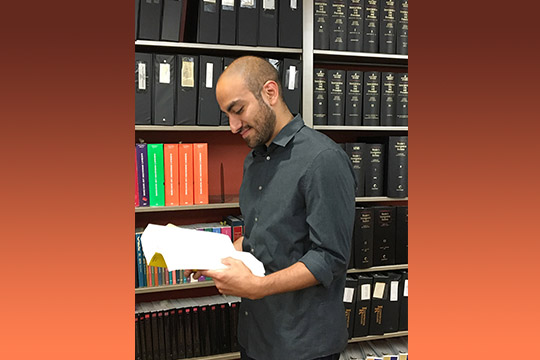
“The arc of the moral universe…”
By Oscar Sarabia Roman, ’17 (Public Policy)
Soon after starting my Public Interest Law Fellowship at the ACLU Immigrants’ Rights Project (IRP), I realized that impact litigation work is a slow process. The process focuses on big-picture outcomes and involves loads of abstract legal theory that apply to cases that may take years or decades to resolve. However, the attorneys never lost sight of how their work and, by extension, my work as an intern, contributed to the ultimate goal of achieving justice.
I was inspired and uplifted by all of the progress made by the ACLU IRP and by the ongoing battles these passionate attorneys are still pursuing. While it is easy to get lost in the legal proceedings, they never lost sight of the individuals they were helping and of the grand scale of their project. They never lost touch with their humanity or with the larger purpose and made sure I never did either. Their commitment reflects the famous quote by Martin Luther King Jr. who once said that, “The arc of the moral universe is long, but it bends towards justice.” Watching these professionals strive to increase civil liberties and immigrant rights has convinced me that this statement is absolutely true.
Oscar is a 2016-17 fellowships peer advisor.
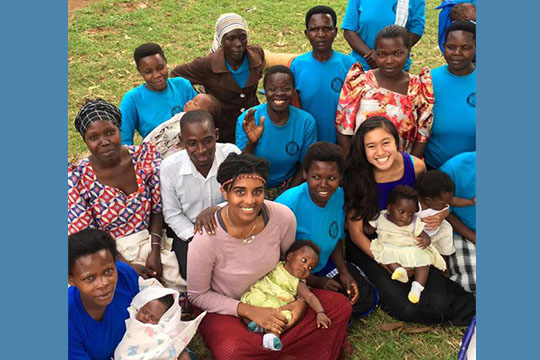
Lessons from Uganda
By Vivian Ho, ’17 (Human Biology)
The drums reverberate in the red dust. The women in the community groups sing to the beat of the drums with a rumble in their voices—a rumble that declares a sense of community, a rumble that states they are effecting change for the issues that matter to them. They are performing dramas about pregnancy, nutrition, and hygiene. The crowd, with over 500 people, is listening.
With the support of a Halper fellowship through the Haas Center for Public Service, I worked with Safe Mothers, Safe Babies (SAFE), a nonprofit organization aimed at reducing maternal mortality rates in eastern Uganda. My time in Uganda challenged my norms and made me evaluate new ones. It forced me to recognize how activism and seeking justice can be loving to the populations who desire to be heard, especially women. It gave me personal stories and examples of frameworks to life that are different from my own, and yet somehow they are not so different. It has given me an itch to recognize the status quo and not be settled in it.
When I left the U.S., I expected simply to do a public health internship in Uganda. By the end of my time there, I realized I had found a family. In the words of a village member, “You have roots here in Uganda. You’re a Musoga.”
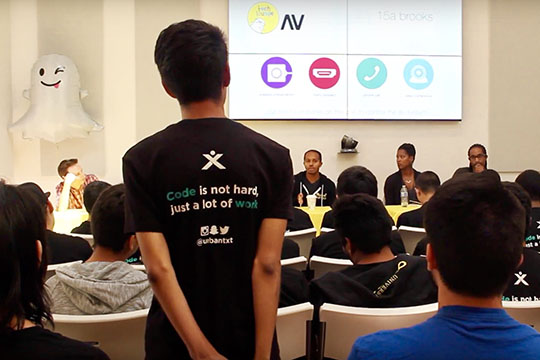
“First place—Safe Zone.”
By Po Tsui, ’19 (Symbolic Systems) and Naomi Gregorio, ’19 (Mechanical Engineering)
As the winner was called, Anthony Ramirez, a sophomore from LACES High School, rose in disbelief to his feet. A USC lecture hall filled to capacity—families with young siblings, startup investors from Silicon Valley, media crews, and twenty-nine male high school students from South Central Los Angeles—witnessed as Anthony and his team won $5,000 seed funding for Safe Zone, a start-up mobile application that helps teens connect with doctors and health clinics regarding sexual health with the aim of preventing teen pregnancy and STDs, an issue these inner city youth can personally relate to.
At Teens Exploring Technology, we worked as coaches in the Summer Leadership Coding Academy to teach programming, entrepreneurship, product development, and leadership. Each team pulled all-nighters and struggled throughout the development process as they were constantly dared to break the limits not only of their product, but also of their own personal conviction. With the needs of their community in mind, they designed wireframes, built databases, pitched to investors, and grew to be effective leaders. Whether or not these students’ apps will endure the test of time and transform the world, the true products—their transformed selves—certainly will.
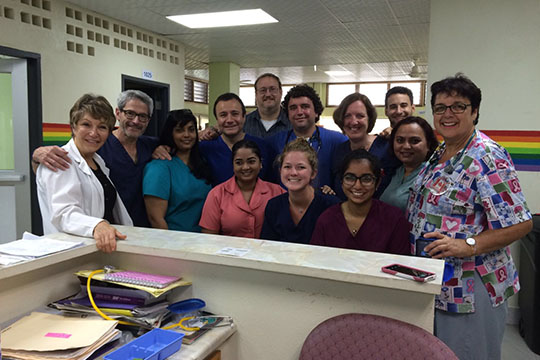
He’s tumor free
By Riasoya Jodah, ’19 (Undeclared)
Three days after my fellowship ended, I got a text message from my former co-workers in our group chat that I couldn’t bring myself to leave just yet. It was a picture of a smiling boy swaddled in blankets with tubes resting beneath his nose. The caption read “He’s tumor free.”
Shawn is an eight year old indigenous boy who was admitted to pediatric surgical ward of the Georgetown Public Hospital Cooperation the day I started my Halper International Fellowship in Georgetown, Guyana. He came in with a near lethal snake bite, but my team also found a mass that turned out to be a Wilm’s Tumor in his kidney. Shawn, like many other patients that I worked with, lives in a remote village and arrived via medivac to the hospital. It’s quite possible that his tumor would have remained undiscovered if he hadn’t been forced to seek care due to the snake bite.
His struggle is familiar to the thousands of indigenous people without access to health care in Guyana. After a grueling 10 weeks of biopsies and treatments, Shawn underwent surgery where the tumor was entirely removed. He’s back home now; a healthy boy with his family. I receive an updated picture whenever he visits the hospital for a follow-up, and it serves as a reminder of the service I owe to the people of my home.
Ria is a 2016-17 fellowships peer advisor.
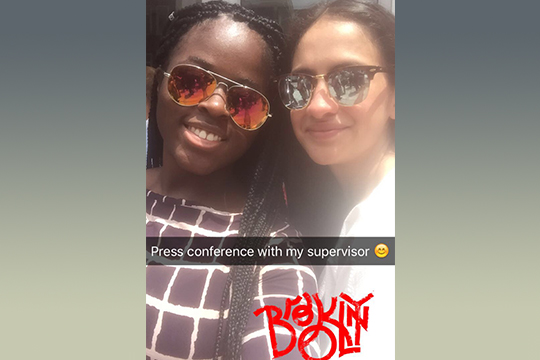
When a house can’t be a home
By Zora Zambezi Williams, ’19 (Undeclared)
No water. No gas. No heat. Bedbugs. Mold. And more. When someone prevents a house from being a home, that is when the Fair Housing Advocates step in. This summer I got to play that role in the fight to preserve the sanctity of home at Brooklyn Legal Services Corporation A (BKA) for tenants in Brooklyn, NY.
I worked on buildings where landlords would offer buyouts to long-term residents in order to renovate and revalue old apartments to market rate tenants. People were harassed out of their homes by landlords with bogus non-payment cases, utility shut offs and refusals to address repair concerns. In one case, a tenant was harassed by the super of her building when he climbed her fire escape and tapped on her window unannounced.
Since these tenants were denied a safe home we, BKA, demonstrated on the steps of City Hall, brought cases to state court, and ultimately galvanized the tenants to organize themselves to take action against their disparate treatment. We reminded them of the power and rights that they have to keep their superiors accountable, because when a house can’t be a home, there are no roots from which a seed can be grown.
Zora is a 2016-17 fellowships peer advisor.
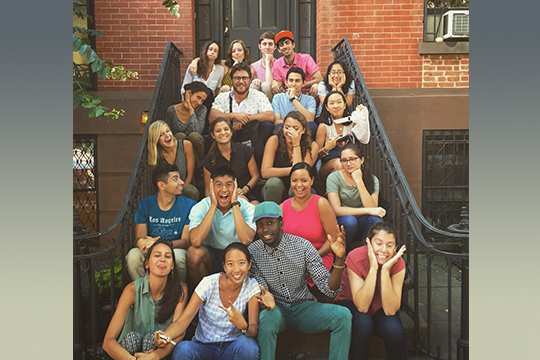
Justice for all
By Bunnard Phan, ’18 (Philosophy and Literature)
My partner and I hunched over the small monitor, downloading the surveillance footage. As investigators for Brooklyn Defender Services (BDS), a public defender’s office in New York, we gathered evidence to support BDS’s cases, and on this day, we’d just recovered video that proved our client’s innocence.
I was relieved, yet stunned. It seemed crazy and unfair how quickly our client’s life had turned upside down: one false and unfounded accusation had caused him to be arrested and jailed, because he wasn’t able to afford bail. How was this possible? Was it because of where he lived or the way he looked? Our client was a year younger than me, and I could only imagine what he and his family had gone through. I wondered, What would have happened if we hadn’t recovered the video?
Investigating cases for BDS made me reconsider my beliefs about our criminal justice system. I began my internship confident that our justice system was a place where truth prevailed and most people got their just desserts. I learned that the reality was not so simple. Speaking with lawyers and judges, I learned about tactics such as overcharging to coerce defendants to accept plea deals. Speaking with our clients, I learned about the consequences an arrest could have, even if our clients weren’t found guilty. Most of all, their experiences showed me how easy it is for someone to be exploited because of their appearance and poverty. My summer opened my eyes to the complexity of our criminal justice system and increased my desire to learn more about how it operates.
